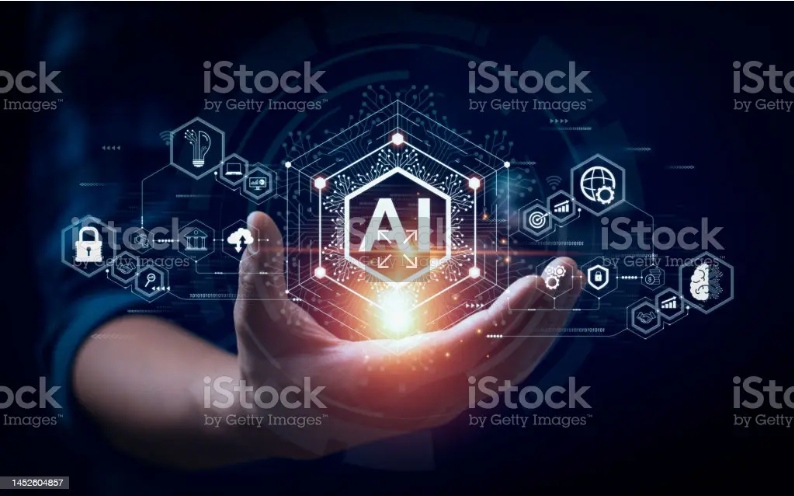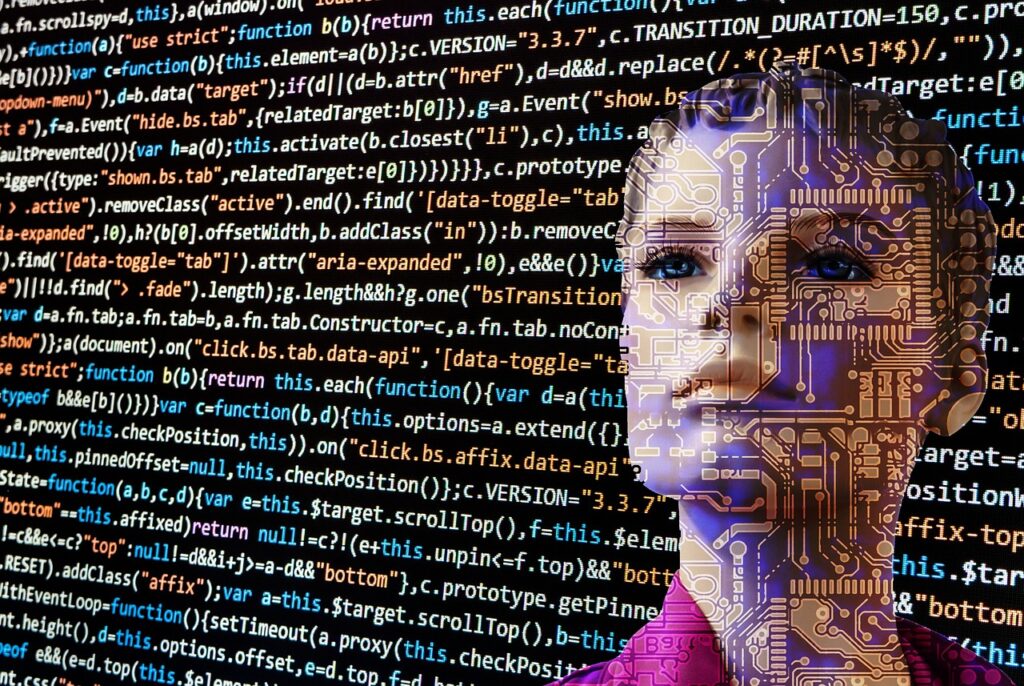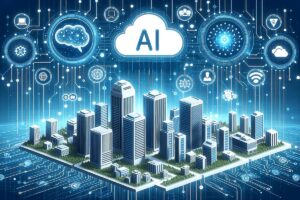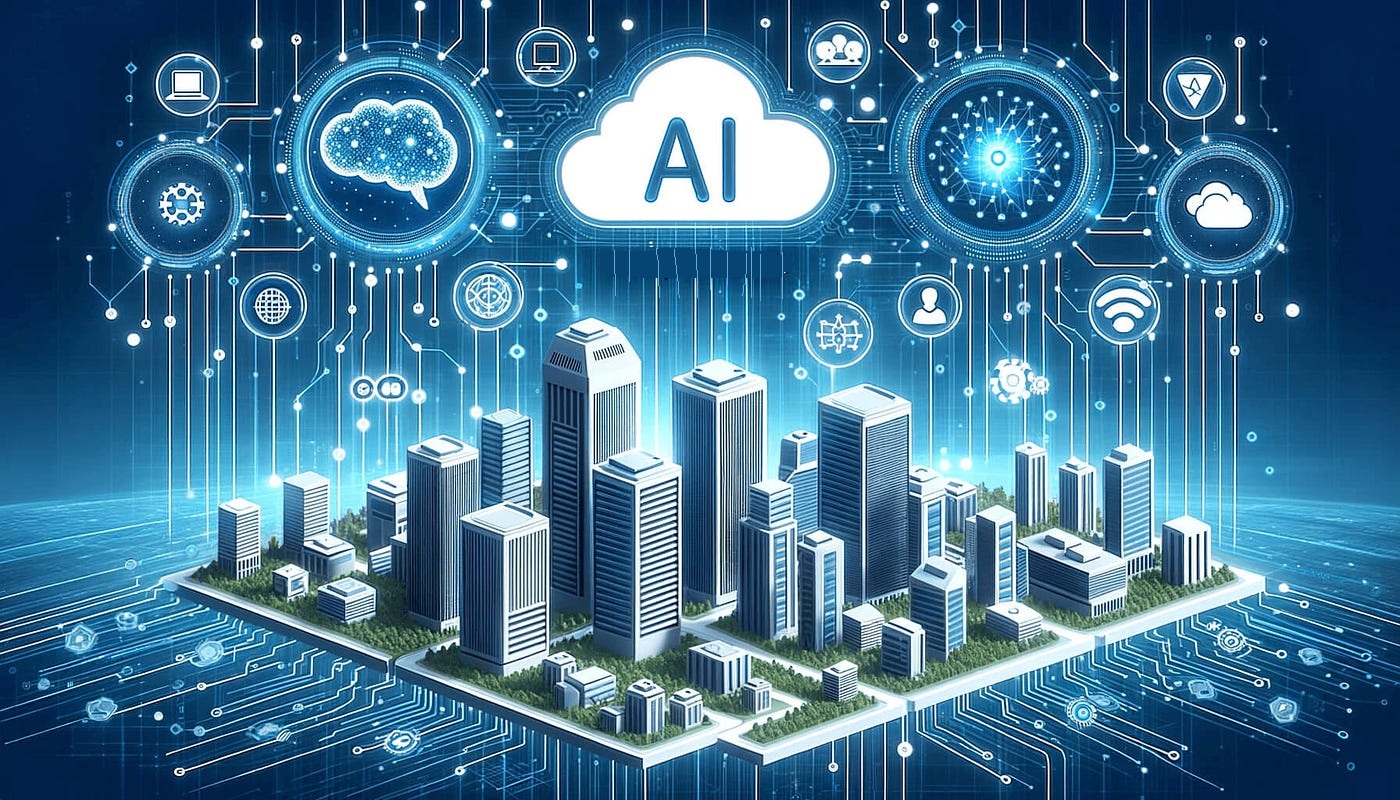Table of Contents
ToggleArtificial Intelligence
Artificial Intelligence
Artificial Intelligence (AI) is a Groundbreaking Technology that Simulates Human Intelligence and decision-Making Capabilities in Machines. With its ability to learn, Reason and Perform tasks Autonomously, AI has rapidly Transformed Various Industries and Continues to shape the future of Technology. In this Article we will delve into the Fundamentals of AI, its Historical Evolution, Current Applications and Potential Implications for Society.
I. What is Artificial Intelligence?
Artificial Intelligence can be defined as the Development of Computer Systems that can Perform tasks Typically Requiring Human Intelligence. These tasks include Problem Solving, Speech Recognition, Learning, Planning and Decision Making. AI is fueled by Algorithms and Large Datasets, Enabling Machines to learn from Experience and Improve their Performance over time. The two Primary types of AI are:
1. Narrow AI
Also Known as Weak AI, Narrow AI is Designed to Perform Specific tasks within a Limited Domain, such as Virtual Assistants, Image Recognition Systems and Language Translation Applications.
2. General AI
Also Referred to as Strong AI or Artificial General Intelligence (AGI), General AI Possesses the Ability to Understand, learn and apply Knowledge across a Broad Range of tasks, Similar to hum Intelligence.
II. Historical Evolution of Artificial Intelligence
The roots of AI can be traced back to the 1950s when researchers began Exploring the concept of Machines that could think like Humans. Pioneers like Alan Turing and John McCarthy laid the foundation for AI by introducing the Turing Test and coining the term “Artificial Intelligence,” Respectively. Over the decades, AI Experienced Significant Milestones, Including:
1. Early AI Systems
The Development of expert Systems and rule-based Programs Marked the Initial Stage of AI, Enabling Computers to mimic Human Reasoning in Specific Domains.
2. Machine Learning Emergence
In the 1980s, machine learning algorithms such as neural networks and genetic algorithms gained Prominence, Allowing AI systems to learn from data and Improve their Performance.
3. AI Winter
Despite Advancements, AI faced a period of reduced funding and Interest in the late 1980s and 1990s, Commonly Referred to as the AI Winter.
4. AI Resurgence
The 21st century witnessed a Resurgence of AI, Driven by the Availability of big data, Increased Computational Power and Breakthroughs in deep Learning.
III. Current Applications of Artificial Intelligence
AI has Revolutionized multiple Industries and Everyday Activities. Some Prominent Applications of AI Include:
1. Natural Language Processing (NLP)
AI-Powered Virtual Assistants like Siri and Alexa use NLP to Understand and Respond to Human Speech.
2. Image and Video Recognition
AI Algorithms can Identify and Categorize Objects, Faces and Scenes in Images and Videos, Enabling Applications like facial Recognition and Autonomous Vehicles.
3. Healthcare
AI is Transforming Healthcare through Diagnosis Assistance, Drug Discovery and Personalized Treatment plans.
4. Finance
AI is Employed for fraud Detection, Credit Risk Assessment and Algorithmic Trading in the Financial sector.
5. Manufacturing
AI Driven Automation Improves Efficiency and Quality in Manufacturing Processes.
6. Customer Service
AI-powered Chatbots Provide instant Customer Support and Reduce Response times.
IV. Ethical Considerations in AI Development
As AI Becomes Increasingly Integrated into Society, Ethical Concerns have arisen Regarding its Responsible Development and Deployment. Some of the key ethical Considerations Include:
1. Bias and Fairness
AI Algorithms can Perpetuate Existing Biases Present in the data used for Training, Leading to unfair Outcomes for Certain Groups.
2. Privacy and Security
AI Systems often rely on vast Amounts of Personal data, Raising Concerns about Privacy and data Protection.
3. Job Displacement
The Automation Potential of AI Raises Questions about job Displacement and the need for Retraining the Workforce.
4. Accountability and Transparency
AI Systems should be Transparent, Explainable and Accountable for their Decisions.
V. Future Prospects of Artificial Intelligence
The future of AI holds Tremendous Potential and Challenges. Some key areas of Development and Potential Advancements Include:
1. Artificial General Intelligence (AGI)
Researchers aim to Create Machines that Possess Human-like General Intelligence, Capable of Understanding and Learning across Various Domains.
2. Robotics and AI Integration
AI-Powered Robots could Revolutionize Industries like Healthcare, Manufacturing and Agriculture.
3. Quantum AI
4. AI in Space Exploration
AI-enabled space Exploration Could lead to Autonomous Spacecraft and better Understanding of the Universe.
Artificial Intelligence has Emerged as a Groundbreaking Technology that is Reshaping the world as we know it. From narrow Applications to the Potential of AGI, AI offers Unparalleled Opportunities for Advancement across various sectors. However, Ethical Considerations must be at the fore front of AI Development to ensure Responsible and Equitable Deployment.
https://mdzaka.com/artificial-intelligence-ai-vertex-ai-generative-ai-c3-ai-ai-technology/

AI Technology
AI Technology: Transforming The World Across Industries
Artificial Intelligence (AI) Technology Has Rapidly Evolved From A Concept In Science Fiction To A Powerful Force That Drives Innovation Across Industries. AI Is The Simulation Of Human Intelligence In Machines, Enabling Them To Perform Tasks That Typically Require Human Intelligence, Such As Learning, Problem-Solving And Decision-Making. In This Article, We Will Explore The Various Facets Of AI Technology, Its Historical Development And Its Wide-Ranging Applications In Different Sectors.
I. Evolution Of AI Technology
- The Birth Of AI
The Concept Of AI Dates Back To The 1950s When Scientists And Researchers Began Exploring The Idea Of Creating Machines That Could Imitate Human Intelligence. Pioneers Like Alan Turing And John Mccarthy Laid The Foundations For AI Research And Coined The Term “Artificial Intelligence.”
- Early Developments
In The Early Stages Of AI Research, Efforts Were Focused On Creating Expert Systems That Could Mimic Human Decision-Making In Specific Domains. However, Progress Was Limited Due To The Lack Of Computational Power And Data Availability.
- The AI Winter
The Field Of AI Experienced Periods Of Slow Progress, Known As “AI Winters,” Where Funding And Interest Waned Due To Unrealistic Expectations And Challenge In Developing Sophisticated AI Systems.
- The Rise Of Machine Learning
In The 21st Century, Advancements In Machine Learning, Particularly Deep Learning, Fueled A Resurgence In AI Research. Increased Computing Power And AccessTo Vast Amounts Of Data Enabled Breakthroughs In AI Technology.
II. Core Concepts Of AI Technology
- Machine Learning
Machine Learning Is A Subset Of AI That Enables Computers To Learn From Data Without Explicit Programming. Supervised, Unsupervised And Reinforcement Learning Are Common Types Of Machine Learning Approaches.
- Deep Learning
Deep Learning Is A Subset Of Machine Learning That Utilizes Artificial Neural Networks To Model And Process Complex Data Representations. It Has Been Instrumental In Various AI Applications, Including Image And Speech Recognition.
- Natural Language Processing (NLP)
NLP Focuses On Enabling Machines To Understand, Interpret And Generate Human Language. It Forms The Basis For Virtual Assistants, Language Translation, Sentiment Analysis And More.
- Computer Vision
Computer Vision Involves Teaching Machines To Interpret And Understand Visual Information From Images And Videos. Applications Range From Facial Recognitio To Autonomous Vehicles.
III. AI Applications Across Industries
- Healthcare
AI Is Transforming Healthcare With Applications Such As Medical Image Analysis, Disease Diagnosis, Drug Discovery And Personalized Treatment Plans.
- Finance
In The Financial Sector, AI Is Utilized For Fraud Detection, Algorithmic Trading, Customer Service And Credit Risk Assessment.
- Manufacturing
AI-Driven Automation And Robotics Are Enhancing Manufacturing Processes, Optimizing Supply Chains And Improving Product Quality.
- Retail
AI Is Powering Recommendation Engines, Customer Segmentation And Inventory Management In The Retail Industry.
- Transportation
In Transportation, AI Is Being Employed For Autonomous Vehicles, Traffic Management And Predictive Maintenance Of Fleets.
IV. Ethical Considerations And Challenges
- Bias And Fairness
AI Systems Can Inherit Biases From Training Data, Leading To Discriminatory Outcomes. Addressing Bias And Ensuring Fairness Is A Critical Ethical Consideration In AI Development.
- Privacy And Security
AI Applications Often Deal With Sensitive Data, Raising Concerns About Privacy And Security. Implementing Robust Data Protection Measures Is Essential To Safeguard User Information.
- Accountability And Transparency
AI Decision-Making Processes Can Be Opaque, Making It Crucial To Ensure Transparency And Accountability In AI Systems.
- Job Displacement
The Automation Potential Of AI Raises Concerns About Job Displacement, Necessitating Strategies For Reskilling And Upskilling The Workforce.
V. Future Prospects Of AI Technology
- Continued Advancements
AI Technology Is Expected To Continue Evolving, With Breakthroughs In Areas Like Explainable AI, Quantum Computing And Neuro-Symbolic AI.
- AI In Space Exploration
AI Is Likely To Play A Significant Role In Space Exploration, Enabling Autonomous Spacecraft And Robotic Missions.
- Ethical AI Frameworks
The Development Of Ethical AI Frameworks And Regulations Will Become Increasingly Important To Guide Responsible AI Deployment.
AI Technology Has Evolved From A Theoretical Concept To A Transformative Force That Permeates Multiple Aspects Of Modern Life. From Revolutionizing Industries Like Healthcare, Finance And Manufacturing To Enabling Intelligent Virtual Assistants In Our Homes, AI’s Impact Is Profound. As We Embrace The Potential Of AI Technology, It Is Crucial To Address Ethical Considerations And Ensure Its Responsible And Equitable Deployment.

Vertex AI
Vertex AI : Advancing Artificial Intelligence With Google’s Cutting-Edge Platform
Vertex AI Is A Groundbreaking Platform Developed By Google That Is Revolutionizing The Field Of Artificial Intelligence (AI). Built On Google Cloud, Vertex AI Provides A Unified And Intuitive Interface For Machine Learning Developers And Data Scientists To Streamline Their AI Development Process. In This Article, We Will Explore The Features And Capabilities Of Vertex AI, Its Advantages Over Traditional Machine Learning Platforms And The Impact It Is Making In Various Industries.
I. The Rise Of Vertex AI
The Field Of AI Has Witnessed Significant Growth In Recent Years, With Machine Learning Models Becoming Increasingly Sophisticated And Versatile. However, Traditional AI Development Platforms Often Posed Challenges For Developers In Terms Of Complexity, Scalability And Lack Of Integration. Recognizing These Limitations, Google Introduced Vertex AI To Simplify And Optimize The AI Development Lifecycle.
II. Key Features And Capabilities Of Vertex AI
Unified Interface
Vertex AI Provides A Single Platform For All Stages Of The Machine Learning Lifecycle, From Data Preparation And Model Training To Deployment And Monitoring. This Unified Interface Streamlines The Development Process And Reduces The Need For Switching Between Different Tools.
- Automl
Vertex AI’s Automl Capabilities Enable Developers With Limited Machine Learning Expertise To Build And Deploy High-Quality Models Without Extensive Coding. It Automates Tasks Such As Feature Engineering, Hyperparameter Tuning And Model Selection, Making AI Development Accessible To A Broader Audience.
- Pre-Built Models
Vertex AI Offers A Library Of Pre-Built Models For Common AI Tasks, Such As Image And Speech Recognition, Natural Language Processing And Recommendation Systems. Developers Can Leverage These Models To Accelerate Development And Reduce Time-To-Market.
- Custom Model Training
For More Complex Tasks, Vertex AI Supports Custom Model Training With The Flexibility To Choose The Underlying Infrastructure And Hardware For Performance Optimization.
- Mlops And Model Deployment
Vertex AI Streamlines The Deployment Process By Enabling Developers To Easily Deploy Models To Production With Built-In Mlops Tools. This Ensures Seamless Integration And Scalability Of AI Solutions.
III. Advantages Of Vertex AI Over Traditional Platforms
- Scalability
Vertex AI Leverages The Power Of Google Cloud’s Infrastructure, Allowing Developers To Scale Their AI Projects Efficiently Based On Demand. This Ensures Smooth Performance Even With Large Datasets And Complex Models.
- Cost-Effectiveness
The Pay-As-You-Go Model Of Vertex AI Ensures Cost-Effectiveness, As Developers Only Pay For The Resources They Use, Eliminating The Need For Upfront Infrastructure Investments.
- End-To-End Integration
Vertex AI’s Seamless Integration With Other Google Cloud Services, Such As Bigquery And Dataflow, Simplifies Data Ingestion And Preparation, Making The Entire AI Development Process More Efficient.
- Advanced Security
Google Cloud’s Robust Security Protocols And Data Encryption Mechanisms Ensure That AI Projects On Vertex AI Are Protected From Potential Threats And Data Breaches.
IV. Vertex AI In Real-World Applications
Vertex AI’s Versatility And Ease Of Use Have Made It A Game-Changer In Various Industries. Some Real-World Applications Of Vertex AI Include:
- Healthcare
Vertex AI Is Being Utilized To Develop AI-Powered Diagnostic Tools, Drug Discovery Algorithms And Personalized Treatment Recommendations, Revolutionizing Healthcare Delivery.
- Finance
The Financial Industry Is Leveraging Vertex AI For Fraud Detection, Risk Assessment And Customer Service Automation, Enhancing Security And Customer Experience.
- Retail
Retailers Are Using Vertex AI To Optimize Supply Chain Management, Improve Demand Forecasting And Provide Personalized Recommendations To Customers.
- Autonomous Vehicles
Vertex AI Is Playing A Crucial Role In Developing Advanced Driver Assistance Systems (ADAS) And Autonomous Vehicles, Making Transportation Safer And More Efficient.
V. The Future Of Vertex AI
As The Field Of AI Continues To Evolve, Vertex AI Is Poised To Play A Central Role In Shaping Its Future. Google’s Ongoing Investment In Research And Development Is Expected To Further Enhance Vertex AI’s Capabilities, Offering Even More Sophisticated Models And Seamless Integration With Emerging Technologies Like Quantum Computing.
VI. Addressing Ethical Considerations
With The Increasing Adoption Of AI, It Is Crucial To Address Ethical Considerations Related To Data Privacy, Bias And Transparency. Google Has Taken Steps To Ensure That Vertex AI Adheres To Ethical Guidelines And Offers Explainable AI Models To Maintain Transparency.
Vertex AI Stands At The Forefront Of AI Innovation, Offering A Unified, Scalable And User-Friendly Platform That Empowers Developers And Data Scientists To Create Cutting-Edge AI Solutions. Its Advanced Capabilities And Seamless Integration With Google Cloud Services Make It A Game-Changer In Various Industries, Revolutionizing How AI Is Developed And Deployed.

Generative AI
Generative AI : Unlocking Creativity And Innovation Through Artificial Intelligence
Generative AI, A Subset Of Artificial Intelligence (AI), Has Emerged As A Transformative Technology That Brings A New Dimension To Creativity And Innovation. Unlike Traditional AI, Which Focuses On Problem-Solving And Decision-Making, Generative AI Aims To Create Original And Novel Content, Such As Art, Music, Text And Images. In This Article, We Will Explore The Fundamentals Of Generative AI, Its Underlying Technologies And The Applications That Have Captivated Industries And Individuals Alike.
I. What Is Generative AI?
Generative AI Involves The Creation Of New Data Based On Patterns And Examples From Existing Data. It Leverages Machine Learning Algorithms, Primarily Generative Adversarial Networks (Gans) And Variational Autoencoders (Vaes), To Generate Content That Closely Resembles Human Creations. The Two Main Approaches Within Generative AI Are:
- Gans
Gans Consist Of Two Neural Networks, A Generator And A Discriminator, Engaged In A Competitive Process. The Generator Creates Synthetic Data, While The Discriminator Distinguishes Between Real And Generated Data. The Process Continues Iteratively Until The Generated Content Becomes Indistinguishable From Real Data.
- Vaes
Vaes Are Probabilistic Models That Encode Input Data Into A Lower-Dimensional Space, Called The Latent Space. This Encoded Data Is Then Decoded Back To Reconstruct The Original Data. Vaes Allow For More Controllable Generation Of New Content Compared To Gans.
II. Applications Of Generative AI
Generative AI Has Found Numerous Applications Across Diverse Fields
- Art And Design
Generative AI Is Used To Create Unique Artwork, Designs And Patterns, Offering Artists And Designers New Sources Of Inspiration And Creativity.
- Music Composition
AI-Generated Music Is Being Explored By Composers And Musicians To Develop Novel Melodies And Harmonies, Pushing The Boundaries Of Musical Expression.
- Creative Writing
AI-Powered Text Generation Is Used For Creating Stories, Poetry And Even News Articles, Assisting Writers With Generating Ideas And Content.
- Image Synthesis
Generative AI Can Produce Realistic Images, Making It Useful In Computer Graphics, Virtual Reality And Even Generating Lifelike Avatars.
- Video Game Development
AI-Generated Content Can Be Used To Create Game Levels, Characters And Environments, Enriching The Gaming Experience.
III. Advancements In Generative AI Technologies
Style Transfer: Generative AI Allows Users To Apply The Artistic Style Of One Image To Another, Giving Rise To Artistic Masterpieces.
- Image-To-Image Translation
AI Models Can Translate Images From One Domain To Another, Such As Turning Satellite Images Into Maps Or Converting Sketches Into Photorealistic Images.
- Text-To-Image Generation
AI Models Can Transform Textual Descriptions Into Corresponding Images, Bridging The Gap Between Language And Visual Representation.
- Voice Synthesis
AI-Driven Voice Synthesis Can Replicate Human Speech With Remarkable Accuracy, Enhancing Voice Assistants And Multimedia Applications.
IV. Ethical Considerations In Generative AI
While Generative AI Opens Up Exciting Possibilities, It Also Raises Ethical Concerns
- Misinformation And Deepfakes
AI-Generated Content Can Be Misused To Spread Misinformation, Create Deepfake Videos, Or Fabricate Evidence, Posing Serious Challenges For Media And Society.
- Intellectual Property
Ownership And Copyright Issues Arise When AI Creates Content Resembling Existing Works, Blurring The Lines Of Authorship And Ownership.
- Bias And Representation
If The Training Data For Generative AI Models Is Biased, It May Perpetuate Existing Inequalities And Stereotypes In The Generated Content.
- Consent And Privacy
The Use Of Generative AI To Create Content Based On Personal Data Raises Concerns About Consent And Data Privacy.
V. Future Prospects Of Generative AI
Generative AI Is An Ever-Evolving Field With Promising Future Prospects. As Researchers Continue To Advance Gans, Vaes And Other Generative Models, We Can Expect:
- Improved Realism
AI-Generated Content Is Likely To Become Even More Realistic, Blurring The Line Between Human And Machine Creations.
- Personalization
Generative AI Could Be Utilized To Create Personalized Content Tailored To Individual Preferences And Tastes.
- Collaboration With Creatives
Generative AI May Work Alongside Human Creators, Acting As A Tool To Augment And Inspire Artistic Endeavors.
VI. Embracing Generative AI Responsibly
To Harness The Potential Of Generative AI While Addressing Ethical Concerns, Several Measures Should Be Considered:
- Developing Ethical Guidelines
Creating Industry-Wide Guidelines And Standards For The Responsible Use Of Generative AI.
- Verification And Attribution
Implementing Techniques To Verify The Authenticity Of AI-Generated Content And Providing Proper Attribution.
- Empowering Users
Educating Users About AI-Generated Content And Enabling Them To Discern Between Real And AI-Generated Data.
Generative AI Has Emerged As A Groundbreaking Technology That Has The Potential To Transform How We Create, Innovate And Express Ourselves. From Generating Art And Music To Aiding In Creative Writing And Game Development, Generative AI’s Applications Are Vast And Diverse. As The Technology Continues To Evolve, It Is Essential To Address Ethical Considerations And Promote Responsible Use To Ensure That Generative AI Remains A Powerful Force For Creativity And Innovation While Safeguarding Against Potential Misuse.

C3 Ai
C3 Ai : Empowering Enterprises With AI-Powered Solutions For Digital Transformation
C3 Ai Is A Leading Enterprise AI Software Provider That Is Revolutionizing The Way Organizations Operate By Harnessing The Power Of Artificial Intelligence And Data Science. Founded In 2009 By Dr. Thomas M. Siebel, C3 Ai Has Rapidly Gained Prominence For Its Cutting-Edge AI Platform That Enables Businesses To Extract Insights, Optimize Operations And Drive Innovation.
I. The Journey Of C3 Ai
- Founding Vision
Dr. Thomas M. Siebel, A Renowned Technology Entrepreneur, Recognized The Potential Of AI To Solve Complex Business Challenges And Improve Decision-Making Across Industries. His Vision Was To Build An Enterprise AI Platform That Would Empower Organizations To Harness The Vast Amounts Of Data Available To Them.
- Early Innovations
In Its Early Stages, C3 Ai Focused On Developing A Robust Platform That Could Integrate, Analyze And Visualize Data From Various Sources. The Company Laid The Groundwork For Scalable, Cloud-Based AI Solutions With A Particular Emphasis On Predictive Analytics And Machine Learning.
- Growth And Expansion
As AI Adoption Gained Momentum Across Industries, C3 Ai Expanded Its Offerings To Address Specific Verticals, Such As Energy, Healthcare, Manufacturing And Finance. The Company Collaborated With Industry Leaders And Experts To Tailor Its AI Solutions To Industry-Specific Challenges.
II. Core Capabilities Of C3 Ai
- C3 AI Suite
At The Heart Of C3 Ai ‘s Offerings Lies The C3 AI Suite, An End-To-End Platform That Integrates Data From Disparate Sources And Applies Advanced Machine Learning Algorithms To Derive Actionable Insights. The Suite Enables Users To Build And Deploy AI Applications With Ease, Addressing Various Business Needs.
- Data Integration
C3 Ai ‘s Platform Seamlessly Integrates And Cleanses Data From Multiple Sources, Enabling Organizations To Have A Unified And Comprehensive View Of Their Operations.
- Predictive Analytics
The AI-Powered Predictive Analytics Capabilities Of C3 Ai Allow Businesses To Anticipate Trends, Identify Anomalies And Make Data-Driven Decisions, Leading To Enhanced Operational Efficiency.
- Machine Learning Models
C3 Ai Empowers Organizations To Develop And Deploy Custom Machine Learning Models, Tailored To Their Specific Requirements, Allowing For Personalized And Accurate Insights.
- AI Applications
C3 Ai ‘s Platform Enables The Rapid Development And Deployment Of AI Applications For A Wide Range Of Use Cases, Such As Predictive Maintenance, Fraud Detection, Demand Forecasting And Personalized Customer Experiences.
III. Transformative Impact On Industries
- Energy And Utilities
In The Energy Sector, C3 Ai Is Leveraged To Optimize The Performance Of Energy Assets, Manage Grid Operations And Enhance Predictive Maintenance For Critical Infrastructure.
- Healthcare
C3 Ai ‘s AI Applications Are Used To Analyze Patient Data, Optimize Clinical Operations And Support Disease Diagnosis And Treatment Planning, Leading To Improved Patient Outcomes.
- Manufacturing
Manufacturers Utilize C3 Ai To Optimize Production Processes, Predict Equipment Failures And Streamline Supply Chain Operations, Ultimately Enhancing Productivity And Reducing Costs.
- Financial Services
C3 Ai ‘s AI-Powered Solutions Help Financial Institutions Detect Fraudulent Activities, Assess Credit Risk And Personalize Customer Services, Resulting In Enhanced Security And Customer Satisfaction.
IV. Real-World Use Cases
- Enel
C3 Ai Partnered With Enel, A Global Energy Company, To Develop An AI-Powered Predictive Maintenance Solution. By Analyzing Data From Thousands Of Sensors On Wind Turbines, C3 Ai ‘s Platform Predicted Equipment Failures, Leading To A Significant Reduction In Maintenance Costs And Improved Turbine Performance.
- Shell
C3 Ai Collaborated With Shell, A Leading Energy Company, To Deploy An AI Application For Asset Performance Management. The Platform Provided Real-Time Insights On Equipment Health, Optimizing Maintenance Schedules And Enhancing Operational Efficiency.
- 3M
C3 Ai ‘s AI Solutions Enabled 3M, A Diversified Technology Company, To Improve Demand Forecasting And Inventory Management. The Application Utilized Machine Learning Algorithms To Analyze Historical Sales Data, Resulting In Better Inventory Planning And Reduced Stockouts.
V. Future Prospects Of C3 Ai
- Continued Innovation
C3 Ai Remains Committed To Continuous Innovation, Further Advancing Its AI Platform With The Latest Advancements In Machine Learning, Natural Language Processing And Predictive Analytics.
- Expansion To New Verticals
As AI Adoption Expands, C3 Ai Is Likely To Explore New Verticals And Industries, Tailoring Its Solutions To Address The Unique Challenges Of Each Sector.
- Embracing Edge Computing
With The Proliferation Of Edge Computing, C3 Ai Is Expected To Leverage Edge AI Technologies To Enable Real-Time Data Analysis And Decision-Making At The Network Edge.
VI. Ethical Considerations
As AI Continues To Play An Increasingly Significant Role In Business Operations, Ethical Considerations Must Be Taken Into Account. C3 Ai Recognizes The Importance Of Data Privacy, Security And Transparency And Continuously Ensures Its Solutions Adhere To Industry Standards And Regulations.
C3 Ai is Enterprise AI Platform Has Emerged As A Game-Changer, Empowering Organizations To Harness The Potential Of Artificial Intelligence For Digital Transformation. With Its Powerful AI Suite, Data Integration Capabilities And Vertical-Specific Solutions, C3 Ai Has Garnered Recognition Across Industries For Driving Innovation, Efficiency And Growth.
More..
https://mdzaka.com/
https://mdzaka.com/what-is-pillar-page-types-of-pillar-pages-creating-an-effective-pillar-page/
Creating a Successful Digital Marketing Strategy, What is Marketing Strategy 2023-24
https://mdzaka.com/learn-about-leads-what-leads-are-how-much-is-it-important-for-businesses/
How to Create a Best Landing Page 2023-24











